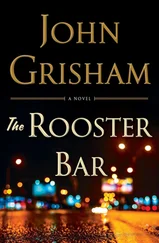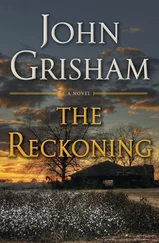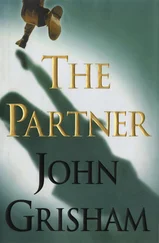He laughs and says, “Truth, justice, and the American way. You must be a fool, Mr. Post, searching for the truth in a place like this.”
“It’s my job, Zeke. It’s the only way I can get Quincy out of prison. You and I both know that you’re an experienced snitch who lied to the jury at Quincy’s trial. He never confessed to you. The details of the crime were fed to you by the cops and prosecutor who rehearsed your story with you. The jury bought it and Quincy has been locked up for twenty-two years. It’s time to get him out.”
He smiles as if he’s only humoring me. “I’m hungry. Can you fetch me a Coke and some peanuts?”
“Sure.” It’s not unusual, even in a place like this, for visitors to buy snacks. I tap on my door and a guard eventually opens it. He and I walk to a wall of vending machines where I start shoving in quarters. Two bucks for a twelve-ounce soda, a dollar each for two small packs of peanuts. The guard takes me back to our room and a few minutes later reappears on Zeke’s side and hands him the goodies. “Thanks,” he says and takes a drink.
It’s important to keep the conversation flowing, so I ask, “How did the cops convince you to testify against Quincy?”
“You know how they operate, Mr. Post. They’re always looking for witnesses, especially when they got no proof. I don’t remember all the details. It was a long time ago.”
“Yes. It’s certainly been a long time for Quincy. Do you ever think about him, Zeke? You know how bad prison is. You ever stop and think that you helped put an innocent man behind bars for the rest of his life?”
“Not really. Been too busy doing other things, you know?”
“Don’t know. Quincy has a chance of getting out. It’s a long shot but then all of them are. This is my work, Zeke, and I know what I’m doing. We need your help.”
“Help? What am I supposed to do?”
“Tell the truth. Sign an affidavit saying that you lied at trial and you did so because the cops and prosecutors offered you a sweet deal.”
He crunches on a mouthful of peanuts and studies the floor. I press on. “I know what you’re thinking, Zeke. You’re thinking that Florida is far away and you have no desire to get involved in a case this old. You’re thinking that if you come clean now with the truth then the cops and prosecutor will charge you with perjury and lock you up again. But that’s not going to happen. The statute of limitations on perjury ran out a long time ago. Plus, they’re all gone. The sheriff retired. The prosecutor did too. The judge is dead. The system back there has no interest in you whatsoever. You have nothing to gain and nothing to lose by helping Quincy get out. It’s really a no-brainer, Zeke. Do the right thing, tell the truth, and your life goes on.”
“Look, Mr. Post, I get out in seventeen months, and I’m not doing anything to screw that up.”
“Arkansas doesn’t care what you did in a Florida courtroom twenty-two years ago. You didn’t perjure yourself here. These guys couldn’t care less. Once you’re paroled, their only concern is filling your cell with the next man. You know how it all works, Zeke. You’re a pro at this game.”
He’s stupid enough to smile at this compliment. He likes the idea of being in control. He sips his Coke, lights another cigarette, finally says, “I don’t know, Mr. Post, it sounds awfully risky to me. Why should I get involved?”
“Why not? You have no loyalty to the cops and prosecutors. They don’t care what happens to you, Zeke. You’re on the other side of the street. Do something good for one of your own.”
There is a long gap in the conversation. Time means nothing. He finishes one pack of peanuts and opens the second. He says, “Never knew of lawyers who do what you do. How many innocent people have you sprung?”
“Eight, in the past ten years. All innocent. We have six clients now, including Quincy.”
“Can you get me out?” he says, and it strikes both of us as funny.
“Well, Zeke, if I thought you were innocent I might give it a shot.”
“Probably a waste of your time.”
“Probably so. Can you help us, Zeke?”
“When’s all this going down?”
“Well, we’re hard at work now. We investigate everything and build a case for innocence. But it’s slow work, as you might guess. There’s no real rush on your part, but I would like to keep in touch.”
“You do that, Mr. Post, and if you find a few extra bucks pass them along. Peanuts and a Coke mean fine dining in this dump.”
“I’ll send some money, Zeke. And if you find a few extra minutes of time, think about Quincy. You owe him one.”
“That I do.”
9
Carrie Holland was nineteen years old when she told Quincy’s jury that she saw a black man running down a dark street at the time of the murder. He was of the same height and build as Quincy and was carrying what appeared to be a stick, or something. She said she had just parked her car in front of an apartment building, heard two loud noises coming from the direction of the Russos’ law office three blocks away, and saw a man running. On cross-examination, Tyler Townsend attacked. She didn’t live in the apartment building but said she was there to visit a friend. The friend’s name? When she hesitated, Tyler reacted with disbelief and mocked her. When he said, “Give me the friend’s name and I’ll call her as a witness,” the prosecutor objected and the judge sustained. From the transcript, it appeared as though she couldn’t remember a name.
Tyler zeroed in on the dark street, one without lighting. Using a map, he pinpointed the buildings and the distance from her car to the Russos’ office and raised questions about her ability to see what she claimed she saw. He argued with her until the judge intervened and made him stop.
She had a drug charge from the year before and Tyler assaulted her with it. He asked her if she was under the influence on the witness stand and suggested that she was still struggling with addiction. He demanded to know if it was true that she had been dating a deputy on the Ruiz County police force. She denied this. When his cross-examination dragged on, the judge asked him to speed things along. When he protested that the prosecutor seemed to be taking his time, the judge threatened him with contempt, and not for the first time. When Tyler was finished with Carrie Holland he had raised doubts about her credibility, but he had also verbally abused her to the point of making her sympathetic to the jury.
Not long after the trial, Carrie left the area. She lived for a while near Columbus, Georgia, married a man there, had two kids, got a divorce and dropped out of sight. It took Vicki a year in one of her many desktop investigations to find the witness living as Carrie Pruitt in a remote part of western Tennessee. She works in a furniture factory near Kingsport, and lives off a county road in a mobile home she shares with a man called Buck.
To her credit, she has managed to stay out of trouble. Her rap sheet has only the drug conviction from Seabrook, one that was never expunged. We’re assuming that Carrie is clean and sober, and in our business that’s always a plus.
A month ago, Frankie eased into the area and did his usual reconnaissance. He has photos of her mobile home and the acreage around it, and of the factory where she is employed. Working with an investigator from Kingsport, he has learned that she has one son in the army and another living in Knoxville. Buck drives a truck and has no criminal record. Oddly enough, his father once pastored a small rural church twenty miles from where they live. There could be an element of stability in the family.
There is also an excellent chance that neither Buck nor anyone else within five hundred miles knows much about her past. This complicates matters. Why should she revisit her brief encounter with Quincy Miller two decades earlier and upset her life now?
Читать дальше












